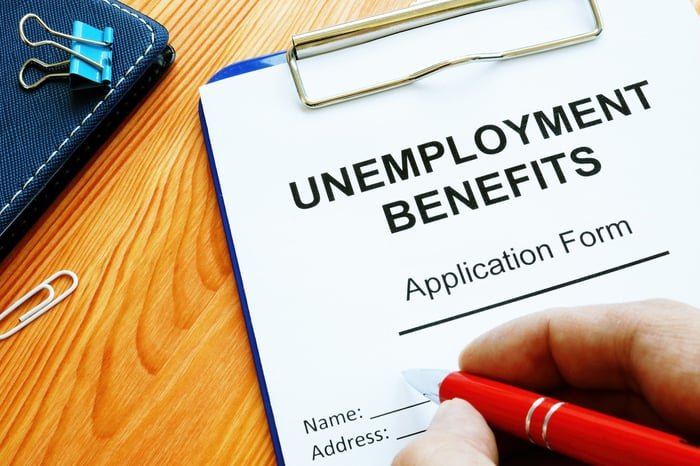
Image source: Getty Images.
While it doesn't influence our opinions of products, we may receive compensation from partners whose offers appear here. We're on your side, always. See our full advertiser disclosure here.
The Coronavirus Aid, Relief, and Economic Security (CARES) Act provided important assistance to the unemployed when it was signed into law at the end of March 2020.
Millions of Americans were left jobless by the COVID-19 pandemic and the restrictions put in place to slow the spread. In response, lawmakers expanded traditional state unemployment programs in several ways. This included increasing the amount of money workers received, extending benefit periods, and broadening eligibility requirements. Freelancers and gig workers, who traditionally don't qualify for benefits were able to claim unemployment.
Unfortunately, some of the added protections put in place by the CARES Act will expire very soon. And, even if Congress takes action and passes another stimulus bill now, there's almost certainly going to be a lapse in benefits. The clock has likely run out on avoiding it.
Lawmakers fight over stimulus bill provisions as the unemployed wait for relief
The unemployed have been in a precarious situation for months, as Congress has debated what to do about providing more coronavirus aid.
The CARES Act provided an extra $600 in weekly benefits, but that extra money was available only until July 31. President Donald Trump subsequently authorized workers to receive an extra $300 per week for six weeks but not all states exercised that option.
More important even than this extra money, though, is the fact that a huge number of workers are set to lose all their unemployment benefits soon. In fact, an estimated 12 million Americans are on track to see their checks end the day after Christmas.
Checks are slated to disappear for:
- Workers who wouldn't normally be eligible for unemployment but who were granted access to benefits by the CARES Act. This includes gig workers and the self-employed.
- Those who have exhausted their eligibility. States often cap the number of weeks workers can get benefits to 26. The CARES Act provided for an extra 13 weeks of benefits and an older program, Extended Benefits, provides federal funding for up to 20 additional weeks of benefits in areas of high unemployment. Unfortunately, time will soon be up for most workers under both programs.
There's bipartisan support to extend benefits for more time, and to offer more money to the unemployed -- although there's been disagreement on exactly how much to offer and how long it should last. Unfortunately, lawmakers have been fighting over other issues, such as whether to provide aid to state and local governments or protect businesses from liability for COVID outbreaks. And, as a result, no relief legislation has passed for months.
The latest proposal on the table from centrist Republicans and Democrats would extend benefits through spring and raise the amount workers get by $300 per week. However, experts are warning that even if Congress were to act right now and pass this proposal -- which isn't likely -- it wouldn't happen fast enough to avoid a lapse in benefits.
The problem is, states administer their own unemployment benefits systems. Much of the technology used to run these is outdated and difficult to update. Congress could change the amount of benefits available, or the duration of time they can be received. But it will take time for states to implement these modifications. In most cases, it could take several weeks.
Unemployed workers could face serious hardship
In the meantime, workers whose benefits are scheduled to end could face serious financial hardship. In fact, even if benefits are extended retroactively, those who've spent months without a job will struggle if they have to go weeks without money being deposited into their bank accounts.
If you're one of the many Americans who could be affected, aim to save as much now as you can to cover your essential bills in case there is an interruption in your income. You can also look into other benefits that may be available.
In the meantime, you may want to consider applying for a coronavirus hardship loan, which typically comes with a lower interest rate than other personal loans and allows you to defer payments.

